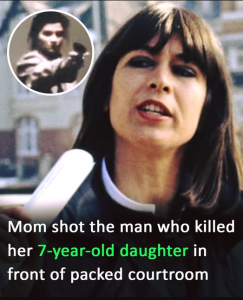The Harrowing Story of Marianne Bachmeier
A Mother’s Tragic Loss
On May 5, 1980, Marianne Bachmeier’s 7-year-old daughter, Anna, was found murdered. The accused, Klaus Grabowski, a 35-year-old butcher and former child molester, was apprehended and stood trial for his crimes.
Vigilante Justice in the Courthouse
On March 6, 1981, during Grabowski’s trial at the Lübeck District Court, Bachmeier entered the courtroom armed with a Beretta 70 pistol. She fired seven shots—six of which struck Grabowski—killing him instantlyHer act of vengeance stunned the nation and opened intense debate about justice, legality, and morality.
Societal Shock and Sympathy
Her actions became one of the most widely publicized cases of vigilante justice in West Germany. Supporters empathized with her grief; she even sold her life story to the magazine Stern for about 100,000 Deutsche Marks, using the funds to cover her legal expenses Still, many argued that the rule of law must prevail, regardless of emotional motivations.
Legal Repercussions and Aftermath
Bachmeier was tried and initially charged with murder. Ultimately, prosecutors accepted that her act was not premeditated. In 1983, she was convicted of manslaughter and unlawful firearm possession and sentenced to six years in prison—but notably served only three years
Life After Prison
Following her release, Bachmeier remarried and lived abroad—in Nigeria and later Sicily—working modest jobs like hospice care. She maintained that her actions were deliberate, intended to enforce justice and prevent further lies about her daughter. In interviews, she reportedly acknowledged rehearsing the shooting beforehand.
Vigilante Justice in Context: Similar Cases
While Bachmeier’s case remains emblematic in Germany, it’s not the only recorded courtroom vengeance. In the United States, Ellie Nesler carried out a similar act:
-
In April 1993, Nesler fatally shot Daniel Mark Driver—accused of molesting her son—directly in a courtroom setting in California. She fired five shots at his head, killing him instantly. Her subsequent trial sparked a nationwide debate on vigilantism. She served about 3½ years in prison after pleading guilty to voluntary manslaughter.
These cases raise challenging questions: When, if ever, does personal grief justify extrajudicial retribution? And how should the legal system respond to emotionally charged crimes committed in the veneer of moral justice?
Reflection and Ethical Complexity
Marianne Bachmeier’s story raises profound dilemmas:
-
Sympathy vs. Justice: She sparked empathy, yet her act bypassed fair trial and due process.
-
Grief’s influence: Does extreme anguish distort moral judgment—or reveal its raw strength?
-
Rule of law vs. individual action: Even in tragic cases, societal order relies on legal boundaries.
Her act wasn’t merely a crime—it became a symbolic clash between institutional justice and visceral human emotion. Whether seen as a tragic vigilante or a mother consumed by sorrow, Bachmeier’s legacy underscores the limits of legal frameworks in the face of unimaginable pain.


